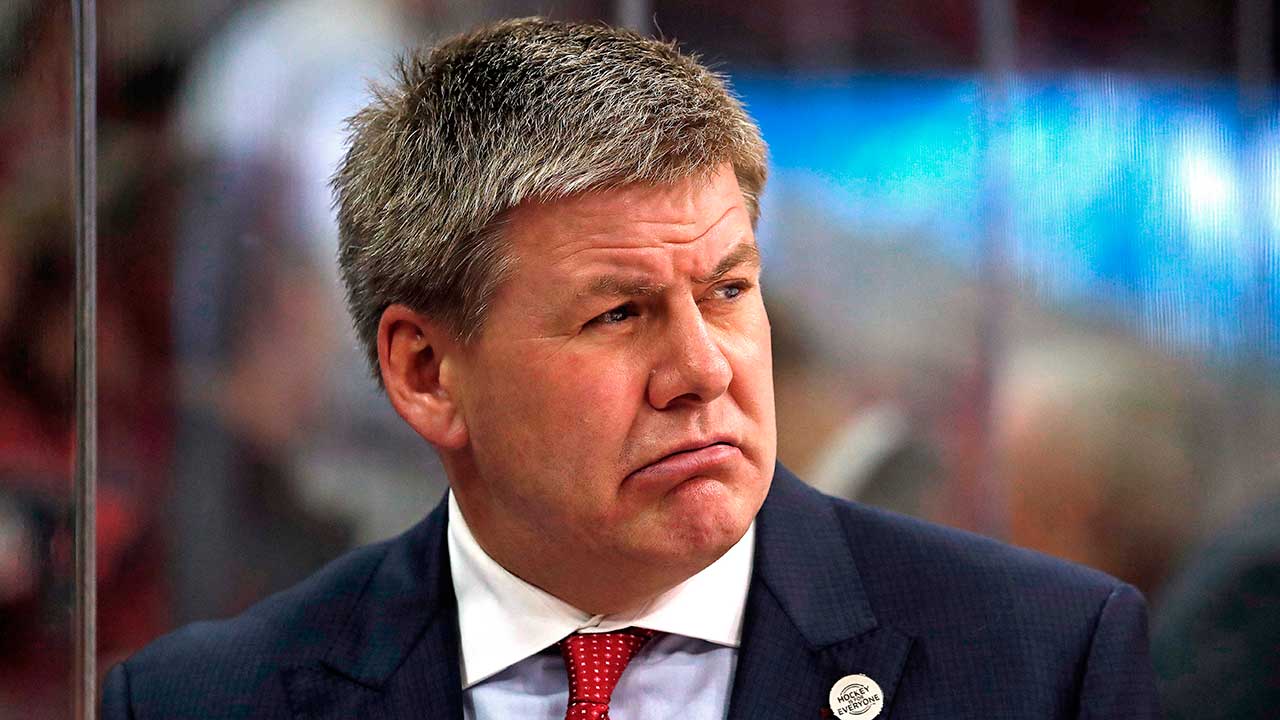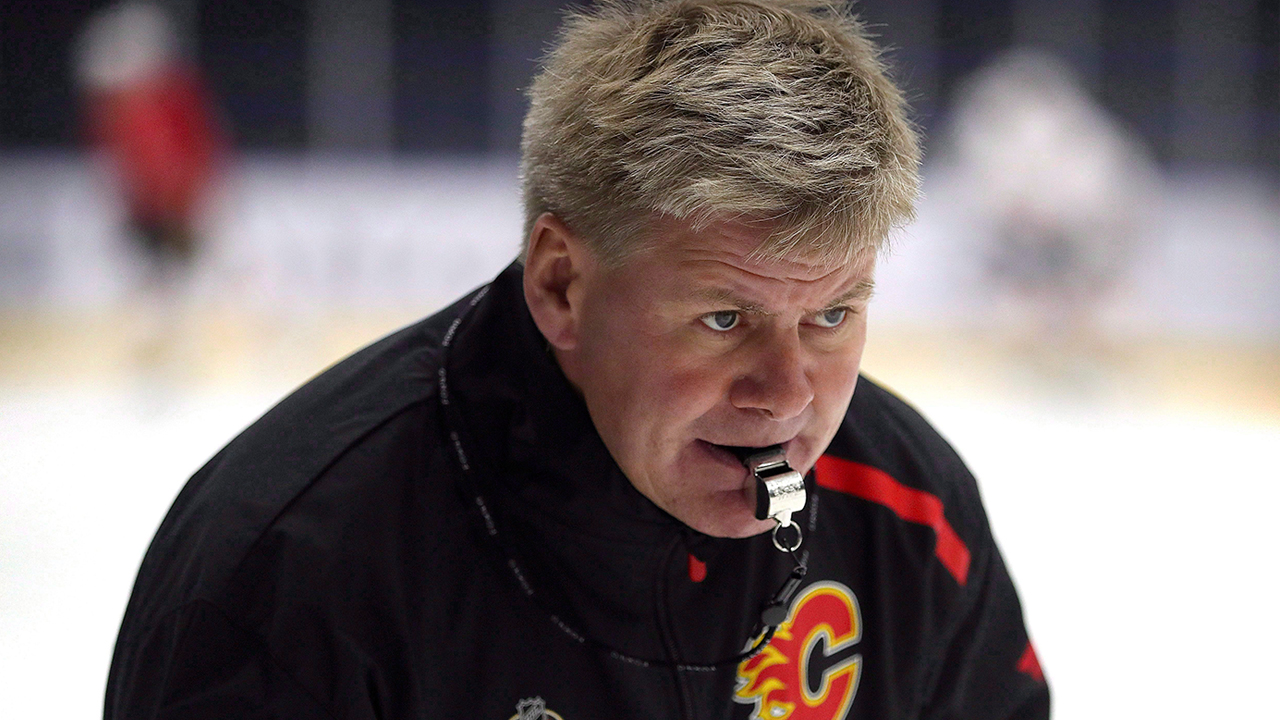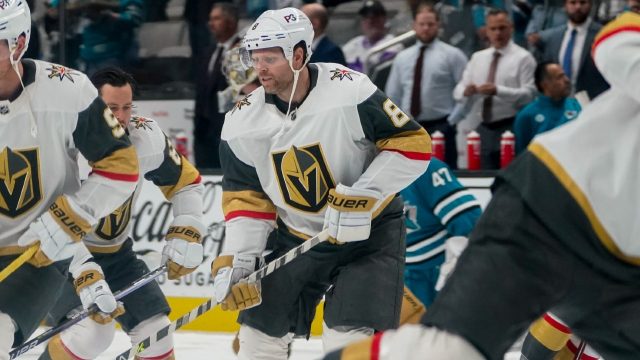
It’s in moments like these that it all starts to come apart at the seams — all the talk of progress, of new eras, of listening and learning.
If you were only glancing, you might think the hockey world was getting somewhere in its pursuit of a more equitable future. But despite the progress that has been made, every so often, the power brokers in the sport still manage to offer up reminders of how stuck in the mud it really is, even still.
The latest indication came Wednesday, as the Western Hockey League’s Lethbridge Hurricanes announced Bill Peters as the 15th head coach in their club’s history. The hiring marks Peters’ first coaching gig in North America since he resigned from his role as head coach of the NHL’s Calgary Flames in 2019, following allegations he racially abused one of his former players, Akim Aliu.
And so, here we go again. For all the seemingly meaningful conversations that have been had throughout the sport over the past few years, we are time and time again reminded that at least some portion of the game’s decision-makers still hold onto a fundamental misunderstanding of what it means to inflict racial abuse on another human being, of the weight carried in the slurs that are thrown around so haphazardly.
After repeated mentions during Wednesday’s press conference of the organizations Peters has worked with of late, of his personal growth, it’s worth also revisiting his actions, all that led to this moment: allegations from Aliu — since corroborated by former teammates and admitted to by the coach himself — that while serving as Aliu’s head coach with the AHL’s Rockford IceHogs, Peters angrily hurled a racial slur at him numerous times during a locker-room tirade, as the rest of the team watched on. The incident was so distressing the team’s captain, Jake Dowell, confronted Peters. Peters’ response was to double down, allegedly using the slur yet again. In the aftermath of the incident, the coach didn’t realize the magnitude of what he’d done, he didn’t reach out to Aliu to apologize — instead, he wrote to the club’s GM and had Aliu sent down to the ECHL.
This isn’t the first time I’ve written a column attempting to explain the harm done by unleashing racist language on someone. That it goes beyond simply isolating the person who has to endure it. That it’s about so much more — the denigration of family, of legacy, of all those who came before you. If making these points again seems repetitive, if it seems obvious, that’s because it is — or, at least, it should be. And yet, somehow, a gap in understanding persists.
The statements from Hurricanes GM Peter Anholt, WHL commissioner Ron Robison and Peters himself on Wednesday made that clear. In defending the decision to allow Peters to guide another group of young athletes, Robison beamed about the WHL being a beacon for inclusivity.
“The Western Hockey League holds the conduct of our players and our staff at a very high standard. We pride ourselves on not only being a world-class development league, but also a leader in providing a safe and positive environment for our players at all times,” he said. “The WHL is a diverse and inclusive organization that is committed to the ongoing education in this area through our industry-leading Respect in Hockey program.”
But it’s not that simple.
Calling yourself a leader and a creator of safe spaces does not make you one. Calling yourself diverse and inclusive does not make it so. It requires more than buzzwords and online modules. It requires substance. It’s in the actions. And whatever action the league took to this point to show its commitment to these issues has been at least partially undone by the decision to allow Peters back into a role that entrusts him with more young athletes’ futures.
“The WHL has a zero tolerance policy regarding any action which is deemed to be derogatory in nature, or discriminatory in nature,” Robison continued. But how stringent can that policy be if it ignores the derogatory and discriminatory actions Peters has publicly admitted to? The message to all those asked to abide by that policy is clear: if enough time passes, and you have the right connections in the right places, “zero-tolerance” becomes a malleable concept.
Peters’ own words on Wednesday underlined the flaws in the decision to hire him.
Appearing remorseful as he took to the podium, the new Lethbridge coach admitted he’d wronged Aliu during their time together in Rockford.
“To Akim, I apologize. I now recognize the impact of my words. I was uneducated in my use of inappropriate language. I take ownership of my actions, and regret my choice of words,” Peters said.
“I failed to create a safe place for Akim, and I’m deeply sorry.”
There was perhaps no clearer indication of just how bizarre the whole affair was than the fact that Peters’ admission of failing — profoundly — to create a safe environment for his players was followed immediately by him speaking of how he relishes the opportunity to return to coaching in a “world-class league” like the WHL, a league that, as we know, prides itself on creating a safe environment for its players.
There’s another wrinkle, too. For all we heard of Peters’ growth, progress, and readiness to return to the responsibility of mentoring young players, he did not, according to Aliu, make any attempts to apologize to Aliu at any point over the past 13 years — or in the four years since details of the incident became public — until last week, when he had a new job opportunity in sight.
Asked by media members in Lethbridge whether Aliu’s timeline is accurate, and if so, why it took him this long to reach out to apologize, Peters said, “In order to make a proper apology, you have to be educated enough to do that.”
If the level of education Peters needed was such that he didn’t understand until last week that an apology was owed to Aliu for what he’d put him through, how are we to believe Peters is far enough along in this process of growth to be entrusted with the future of more young athletes?
It’s not that Peters should be shunned from society for the rest of his days. Growth is good; acknowledgement of past failures is good; engaging in education, learning to respect the people around you, apologizing for harm done — all good. But when the only apparent evidence of those positive steps comes during a press conference to announce an extremely privileged new job opportunity, granted by a GM who repeatedly mentions your 20-plus-year friendship, it all rings hollow.
And it’s the magnitude of the responsibility inherent in this new position that remains the central issue. Peters should be working to educate himself, to better himself, to find meaningful growth. But the notion that taking the very first steps on that journey makes him more qualified to mentor young men than someone who hasn’t been found to have racially abused players in the past — and to have physically abused others — is hard to square.
It’s yet another piece of a bigger, persistent problem with our game. We’re not too far removed from learning what Kyle Beach endured in Chicago, what transpired with Hockey Canada and the 2018 World Juniors team. Over and over again, we’ve been shown the price of trying to win at all costs, of putting success before human beings.
Still, when Anholt took the podium Wednesday to proudly announce Peters’ new position, among the first things he did was list Peters’ past accomplishments in the game — the leagues he’s coached in, the wins he’s amassed, the trophies he’s collected.
Eventually, hopefully, we’ll see more leaders around the sport truly practice what they preach when they reel off their various inclusivity programs and affiliations. Eventually, the decision-makers in the sport who are genuinely pushing for progress will become the majority, and bring about real change.
For now, though, cycles repeat, teams continue to put potential wins above potential harm. And it all starts to come apart.






